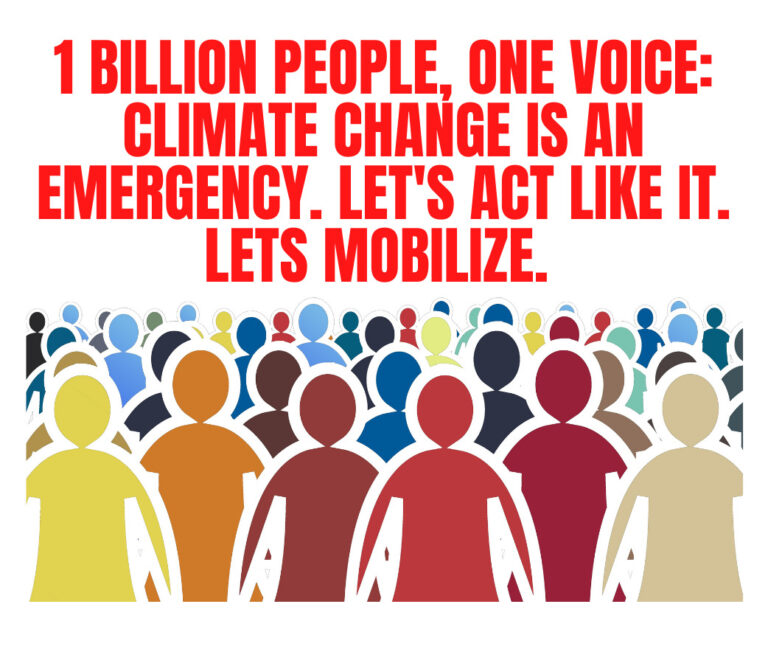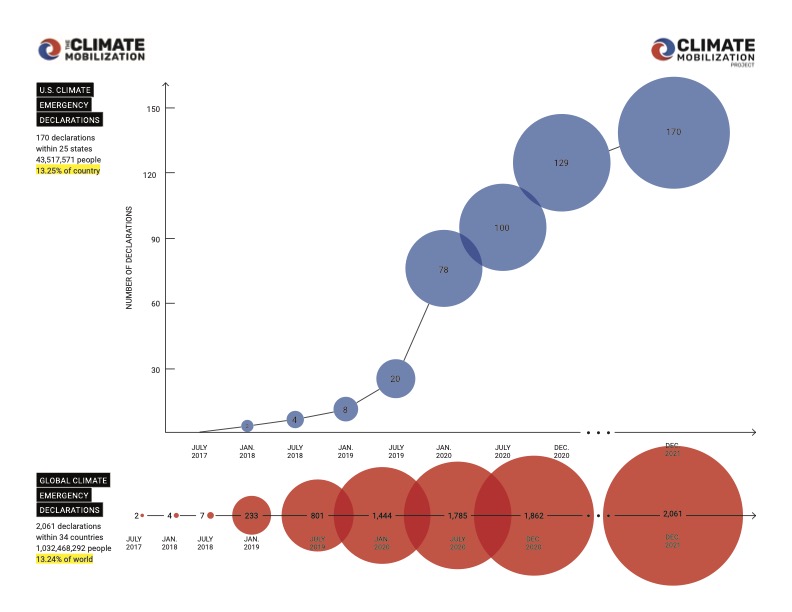Climate Emergency Movement
The Climate Emergency Movement has reached a huge milestone: 1 billion people now live in a jurisdiction that has declared a climate emergency. These billion people are spread out within 34 nations, plus the 27 member states of the European Union. 18 individual national governments have made declarations.
This is big progress, which aligns with the positive shifts happening in the U.S. toward climate action. We’ve seen increases in the amount of air time and attention given to climate solutions. Despite facing opposition in the Senate, the Biden Administration appears committed to pushing forward meaningful legislation. Many towns and cities across the U.S. are adopting climate action plans. Despite this good news, we know that the barriers to the kind of whole-society, whole-economy mobilization that we need remain very high, and change is not moving nearly fast enough.

The advocacy of The Climate Mobilization is needed now more than ever. Our local campaigns are working hard to gather people together to demand that municipalities go beyond their declarations — that they adopt the Climate Emergency 2030 policy platform, consisting of policies that will lower emissions at emergency speed while ensuring that workers and frontline communities benefit from the transition.
Our Climate Mobilization Network is a growing gathering-space for local climate emergency groups who have committed to advocating for just, emergency-speed mobilization. The network gives groups a chance to connect, share their work, and take action together. Anyone who is part of a group that may be interested in joining the Network can get in touch with Rebecca Harris at rebecca@climatemobilization.org for more information.
Real Zero
A report from several advocacy groups, including Friends of the Earth International, shines a light on the practice of relying on “net zero” emissions in setting climate targets across all sectors. The report, titled “The Big Con: How Big Polluters are advancing a “net zero” climate agenda to delay, deceive, and deny” calls out governments and corporations for relying on dubious carbon offsets like geoengineering and carbon capture technology. These false solutions are dangerous or not yet proven on a large scale, and are a convenient way for industry to continue to pollute and avoid the radical, emergency-speed emissions cuts that the science demands. Common Dreams summarized the findings of the report.
The targets pushed by TCM since our founding call for “Real Zero” reductions by 2030, rejecting the “net zero” frame. The report echos this stance, stating “[t]he best, most proven approach to justly addressing the climate crisis is to significantly reduce emissions now in an equitable manner, bringing them close to Real Zero by 2030 at the latest.”
Thank you to our new sustainers
A huge thank you to everyone who gave to our Countdown to 2030 Campaign and an extra special thanks to our new sustainers! Our campaign raised over $13,000 towards bold, innovative climate action and 18 climate warriors have committed to monthly donations as we continue our paradigm-shifting work around the climate emergency. Thank you again, we could not do this without you!
Climate Impacts and Obstruction
The Western United States is in the midst of an extraordinary drought. For those who live in California and other western states, even calling it a “drought” feels like a misrepresentation. More accurately, scientists are telling us that this is a “mega drought” brought on by the climate emergency. The Colorado River, which supplies water to 40 million Americans and farms in the South West, is perilously close to collapse. “We’re at a tipping point. It’s an existential issue for Arizona, California, Nevada. It’s just that simple,” Pat Mulroy, former head of the Southern Nevada Water Authority told CBS News.
Our California-based team members are reporting even drier and more foreboding weather than last year. On the heels of the worst fire season in the history of California in 2020, wildfires are already burning in Arizona, where two different fires have burned more than 138,700 acres.
In Congress, the future of the clean energy, electrification, and energy efficiency components of President Biden’s Infrastructure Bill are in question, as attempts to negotiate a compromise on infrastructure spending have broken down between Senate Republicans and the Biden Administration. Environmentalists fear that key provisions could be scrapped as consolations to Republicans and some Democrats, who are not negotiating in good faith and are delaying real progress under the guise of pursuing bipartisanship. According to Senator Bernie Sanders, efforts to move an infrastructure bill forward using budget reconciliation will continue.
In other news of delay and denial, utility companies, fearing financial losses as consumers purchase solar arrays for home energy generation, are seeking to tack on fees for home solar users and have successfully disincentivized the expansion of rooftop solar in many states.
Resistance and Progress
Over 100 people have been arrested this week during a massive effort by tribal leaders and allied activists to block the Enbridge Line 3 Pipeline, slated to run from Canada through tribal lands and fragile ecosystems of Minnesota. Authorities are using harsh methods in an attempt to deter protestors. Groups like The Indigenous Environmental Network are demanding that President Biden #StopLine3, #HonorTheTreaties, and block the expansion of the pipeline.
This is only amplified by the recent Keystone XL pipeline victory: The pipeline project has been terminated as of June 9th and the Canadian pipeline company that was in charge of it will “continue to coordinate with regulators, stakeholders and Indigenous groups to meet its environmental and regulatory commitments and ensure a safe termination of and exit from the project.” Biden rescinded its construction permit on his first day in office, proving that he has the power to put pressure on fossil fuel companies to end projects that are environmental disasters.
The British government is funding a £30 million project to look at natural methods of drawing carbon dioxide from the air, studying the relative effectiveness of trees, peat and other methods. This will be one of the largest studies of its kind.
Supporting this work
Thank you for your continued interest in The Climate Mobilization and the Climate Emergency Movement. If you can support us with a donation, you’ll help us build community power across the US for emergency declarations and the Climate Emergency Programs that follow.

















